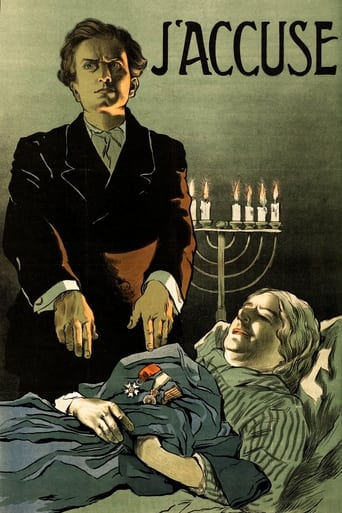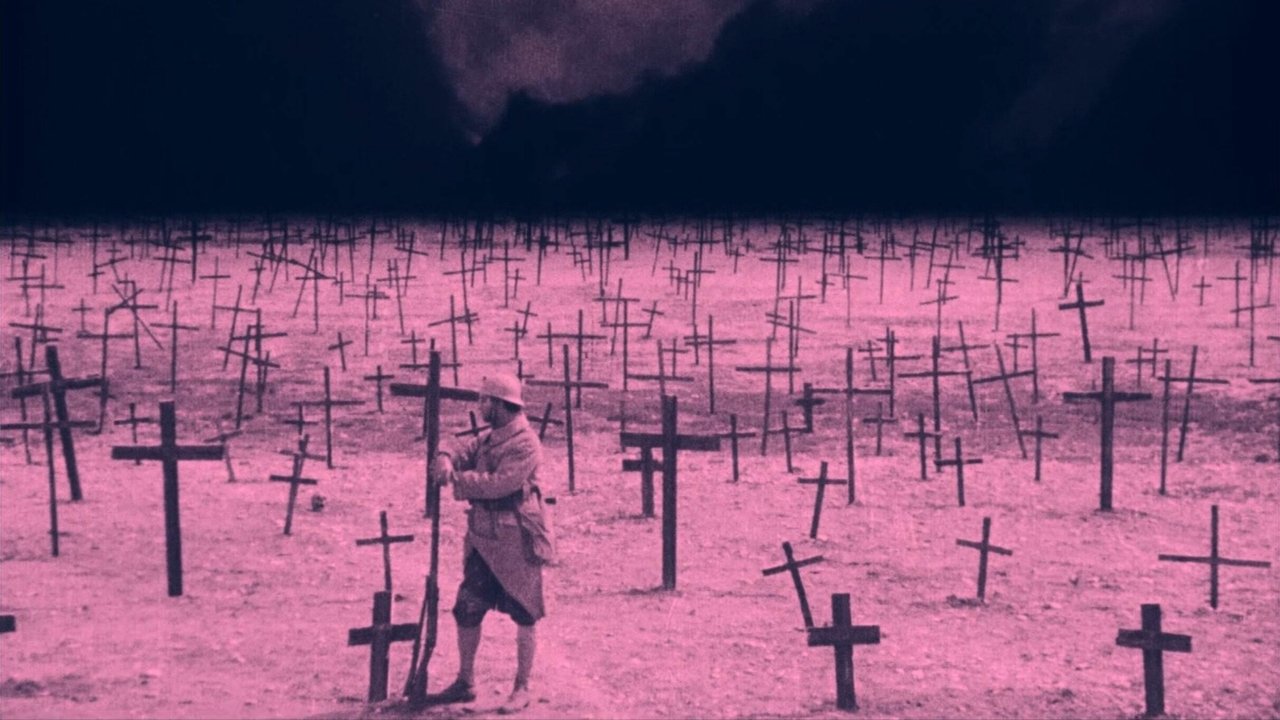peterportez-1
I wish that we could read a comment from at least one of the 91 persons who gave a "1" rating to this silent film masterpiece. What were these 91 thinking? Do they hate all silents? Did they object to the length? If "J'Accuse!" is a "1," why did they suffer through its almost three-hour duration? If they gave up watching after 10 minutes, why bother to vote and muck up the weighted average, now standing at an absurd 6.4? Thank you, Turner Classic Movies, for making "J'Accuse" available to a wide audience. That network is most capably helping fill the void left by the shutting down of most of America's repertory film theaters.
writers_reign
With this movie full of stunning imagery and stylish technique Abel Gance proved that he need take a back seat to no one when it came to mastery of the medium, in other words he forms a triumvirate with Sergei Eisenstein and David Wark Griffith, a triumvirate in which all are equal. The First World War was barely cold in its grave when Gance shot J'Accuse - a motif that recurs throughout from the visually stunning message spelled out by infantry at the outset to the child being taught to write it on a blackboard - yet remarkably what should now seem 'dated' is still potent - seventeen years later Irwin Shaw (who may or may not have seen or been aware of J'Accuse) utilised the concept of the dead protesting at the way in which their lives were squandered in his powerful One-Act play 'Bury The Dead' - and aspects of it were re-worked by others. Like most fine social documents it employs a 'normal' story - in this case our old friend the Eternal Triangle - as a way in to the exploration of political inadequacies and its message still resonates some 87 years later. A Masterpiece.
FerdinandVonGalitzien
In connection with the showing at this German Count's private cinema of the film "Mater Dolorosa" (1917) by Herr Gance some months ago, this Teutonic aristocrat had praised and even eulogized the good film work of this important and essential French film director. "Mater Dolorosa", with its superb cinematographic technique, was a great definitive leap forward in Herr Gance's career."J'Accuse!" confirms aristocratic suspicions about Herr Gance's ability. Because it's without any doubt another great film in which those pioneer cinematographic techniques mentioned before are carried out. Again an excellent example of technical experimentation to achieve a film narrative, J'Accuse is superbly developed
achieving an unquestionable masterpiece."J'Accuse!", besides it's perfect technique, is an emotive antiwar message filmed during the I World War great disaster and with wounds still open. It's a film that denounces the absurdity of war, its uselessness and the terrible consequences that society suffers. It demands the viewer to take note of the great sacrifices and injustices of many broken lives that never will be the same through the fault of the war.And now, if you'll allow me, I must temporarily take my leave because this German Count when mentioning those old wars plenty of lost battles, is slightly Teutonic.
Cineanalyst
The print I saw required my full engagement; it was in poor shape, and the intertitles were in their original French (not my native language). I couldn't even clearly see the words of one. Fortunately, Abel Gance was a very visual filmmaker. And, I understood the gist of what was said. Originally, "J'accuse!" was some three hours, but the video I saw was about 107 minutes. I don't know if there's more footage out there, but I hope this film will be restored (and translated) someday and made more accessible. Its cinematic merits are clear, and the anti-war message is worthy of a larger audience.The Great War ended the expansion of French cinema, ceasing the international market dominance of Pathé Frères. Now, avant-garde filmmakers like Abel Gance rose to prominence, which he did with this film. The narrative of "J'accuse!", in the way of Impressionism, is dictated by the characters' emotions and thoughts, and the juxtaposition of images becomes what has been called "psychological editing". The montages become rapid at times. One of my favorite shots, however, is a tracking long take of Jean on his homecoming. The camera follows him and turns back when he stops to see what he is looking at. There are also many symbolic images of death and religious iconography. The fantastic dénouement of the dead soldiers of war arising to accuse climactically binds the film's message and its impressionistic aesthetic.The story involves a simple love triangle, but which is analogous to the war: the peaceful friendship the two men attain makes the point well. "J'accuse!" is the earliest of powerful anti-war films. It's images and message are not encumbered by too much Christian allegory or over-reaching sentimental appeals, such as with Griffith's "Hearts of the World" (1918) or Ince's "Civilization" (1916). Neither is it overly artistically obscure, and as the popular appreciation of Gance's "Napoléon" (1927) attests to, a large audience of film enthusiasts is out there who would treasure this forgotten monument.(EDIT: Comments below added 4 November 2012)My above comments from over seven years ago were based an abbreviated version that was available on VHS from the distributor Facets during the 1990s. Another IMDb member questioned the validity of these and others' reviews that were written before this film was restored and made available on Turner Classic Movies and the Flicker Alley DVDs. I'll take the opportunity to assure everyone that despite some of my reviews being on obscure films, I watched all of them shortly before writing my comments. Just ask me, and I'll inform of the exact source (usually DVD or VHS). Additionally, this IMDb member was incorrect in stating, "J'accuse" was "assumed lost until quite recently". There've always been incomplete prints available. What we have now is the most complete and crisp version since its initial release, which, as I expressed in my original comments, was what I longed for.Having now seen "J'accuse" in excellent condition, I find the film ever more remarkable—a masterpiece of its time. Its cinematic Impressionism and pacifist message are clearer. There is some outstanding cinematography and editing here for 1919, including chiaroscuro effects, moving camera shots, nighttime scenes, picturesque scenery aside brutal depictions of war and its consequences and ominous images of dancing skeletons. There are iris frames and transitions, good use of fades, split screen and matte shots. In addition to Jean's homecoming, which I mentioned in my earlier comments, other outstanding scenes include those of life in the trenches and a fast-paced montage of the marching on a village. Yet, "J'accuse" isn't about featuring great battle scenes. The greatest scenes take place on the homefront and show the effects of war, including the darkly-lit deathbed sequence of the mother and the finale where the dead soldiers accuse the living, as well as the narrative of the allegorical love triangle that is sacrificed by war.Enhanced by a good-quality print is the film's impressionistic emphasis on light. Beams of light symbolically shine into dark rooms. Scenes of sunrises and sunsets represent Jean's "Ode to the Sun". Superimposed images of Edith walk through Impressionist paintings. Poetry is also essential to Gance's message. The protagonist is a poet turned shell-shocked soldier, but the images and narrative are also poetically told. As Gance once said, "To get the public enthusiastic, you have to get the same feeling into your camera-work—poetry, exaltation
but above all, poetry."


 AD
AD


